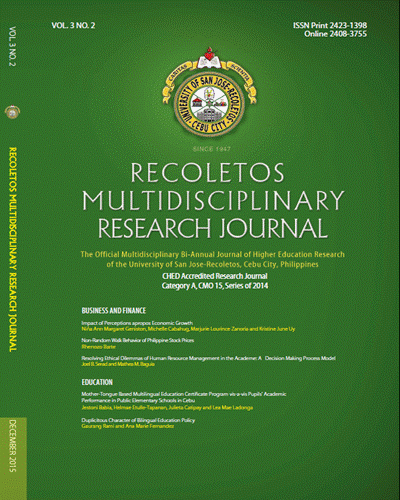Resolving Ethical Dilemmas of Human Resource Management In The Academe: A Decision-Making Process Model
DOI:
https://doi.org/10.32871/rmrj1503.02.03Keywords:
Human resource management, ethical dilemmas, decision-making process, grounded theory, resolutionAbstract
The study explored on the ethical dilemmas of human resource managers and uncovered the process by which the managers resolve the dilemmas. This study used a grounded theory approach to formulate a basic social process model (theoretical model) of resolving those moral conflicts. All informants are human resource managers from private higher education institutions. The study followed the Glasserian grounded theory analysis to formulate a resolution process theory using the data gathered from the beginning. With the use of grounded theory analysis, it was found out that the six main processes used by the informants were (1) Consistency with policies; (2) Character check; (3) Considering consequences; (4) Communication; (5) Cultural sensitivity; and (6) Counteractive mechanism.
References
Fleming, M. & Towey, K. (2002). Delivering culturally effective health care to adolescents. Retrieved from http://www.ama-assn.org/ama1/pub/upload/mm/39/culturallyeffective.pdf
Glaser, B. G., & Holton, J. (2004). Remodeling grounded theory. Forum: Qualitative Social Research, 5(2), 1-17.
Glaser, B. G. (2005). The grounded theory perspective III: Theoretical coding. Mill Valley, CA: Sociology Press.
Holton, J. A. (2010, March). The coding process and its challenges. The Grounded Theory Review, 9(1), 21-40.
John Queripel Associates (2014). Values orientation. Retrieved from http://www.jqassociates.com/assessment/tools/values-orientation.asp
Robinson, D. A. (2003). Ethics and ethical dilemmas, the business ethics synergy star: A technique for defining dilemma and resolving it. Brisbane, AU: Queensland University of Technology.
Treviño, L. K., & Nelson, K. A. (2011). Managing business ethics: Straight talk about how to do it right. Hoboken, NJ: John Wiley & Sons.
Wells, D. & Schminke, M. (2001). Ethical development and human resources training: An integrative framework. Human Resource Management Review, 11(1-2), 135-158.
Wheeldon, J. & Faubert, J. (2009). Framing experience: Concept maps, mind maps, and data collection in qualitative research. International Journal of Qualitative Methods, 8(3), 68-83.
Downloads
Published
How to Cite
Issue
Section
License
Copyright of the Journal belongs to the University of San Jose-Recoletos


